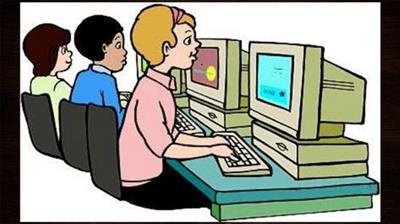
MP4 | Video: h264, 1280x720 | Audio: AAC, 44.1 KHz, 2 Ch
Genre: eLearning | Language: English + srt | Duration: 34 lectures (15h 43m) | Size: 4.64 GB
Computer Science With Python For Class 11 | Covers Latest 2021-22 Syllabus | CBSE
What you'll learn:This course is designed for Class 11 students of CBSE Board. Students will learn about latest computer technologies and learn Python programming basics.
Basics concepts of Information Technology and Basics of Python Programming.
RequirementsStudents should be able to create a Word file, save, browse, play songs in the computer.
DescriptionJoin the course if you are completely new to the computer world. If you want to know about the latest technology. If you want to learn to program.
Syllabus:
● Basic Computer Organisation: Introduction to computer system, hardware, software, input device,
output device, CPU, memory (primary, cache and secondary), units of memory (Bit, Byte, KB, MB,
GB, TB, PB)
● Types of software: system software (operating systems, system utilities, device drivers),
programming tools and language translators (assembler, compiler & interpreter), application
software
● Operating system (OS): functions of operating system, OS user interface
● Boolean logic: NOT, AND, OR, NAND, NOR, XOR, truth table, De Morgan's laws and logic circuits
● Number system: Binary, Octal, Decimal and Hexadecimal number system; conversion between
number systems.
● Encoding schemes: ASCII, ISCII and UNICODE (UTF8, UTF32)
● Emerging trends: Cloud computing, cloud services (SaaS, IaaS, PaaS), blockchains, Artificial
Intelligence (AI), Machine Learning (ML), Internet of Things
Introduction to problem solving: Steps for problem solving (analysing the problem, developing an
algorithm, coding, testing and debugging). representation of algorithms using flow chart and
pseudo code, decomposition
● Familiarization with the basics of Python programming: Introduction to Python, features of
Python, executing a simple "hello world" program, execution modes: interactive mode and script
mode, Python character set, Python tokens (keyword, identifier, literal, operator, punctuator),
variables, concept of l-value and r-value, use of comments
● Knowledge of data types: number (integer, floating point, complex), boolean, sequence (string,
list, tuple), none, mapping (dictionary), mutable and immutable data types
● Operators: arithmetic operators, relational operators, logical operators, assignment operator,
augmented assignment operators, identity operators (is, is not), membership operators (in, not in)
● Expressions, statement, type conversion & input/output: precedence of operators, expression,
evaluation of expression, python statement, type conversion (explicit & implicit conversion),
accepting data as input from the console and displaying output
● Errors: syntax errors, logical errors, runtime errors
● Flow of control: introduction, use of indentation, sequential flow, conditional and iterative flow
control
● Conditional statements: if, if-else, if-elif-else, flowcharts, simple programs: e.g.: absolute value,
sort 3 numbers and divisibility of a number
● Iterative statements: for loop, range function, while loop, flowcharts, break and continue
statements, nested loops, suggested programs: generating pattern, summation of series, finding
the factorial of a positive number etc
● Strings: introduction, indexing, string operations (concatenation, repetition, membership &
slicing), traversing a string using loops, built-in functions: len(), capitalize(), title(), lower(), upper(),
count(), find(), index(), endswith(), startswith(), isalnum(), isalpha(), isdigit(), islower(), isupper(),
isspace(), lstrip(), rstrip(), strip(), replace(), join(), partition(), split()
● Lists: introduction, indexing, list operations (concatenation, repetition, membership & slicing),
traversing a list using loops, built-in functions: len(), list(), append(), extend(), insert(), count(),
index(), remove(), pop(), reverse(), sort(), sorted(), min(), max(), sum(); nested lists, suggested
programs: finding the maximum, minimum, mean of numeric values stored in a list; linear search
on list of numbers and counting the frequency of elements in a list
● Tuples: introduction, indexing, tuple operations (concatenation, repetition, membership & slicing),
built-in functions: len(), tuple(), count(), index(), sorted(), min(), max(), sum(); tuple assignment,
nested tuple, suggested programs: finding the minimum, maximum, mean of values stored in a
tuple; linear search on a tuple of numbers, counting the frequency of elements in a tuple
● Dictionary: introduction, accessing items in a dictionary using keys, mutability of dictionary (adding
a new item, modifying an existing item), traversing a dictionary, built-in functions: len(), dict(),
keys(), values(), items(), get(), update(), del(), clear(), fromkeys(), copy(), pop(), popitem(),
setdefault(), max(), min(), count(), sorted(), copy(); suggested programs : count the number of
times a character appears in a given string using a dictionary, create a dictionary with names of
employees, their salary and access them
● Sorting techniques: Bubble and Insertion sort
● Introduction to Python modules: Importing module using 'import' and using from
statement, Importing math module (pi, e, sqrt, ceil, floor, pow, fabs, sin, cos, tan); random module
(random, randint, randrange), statistics module (mean, median,mode)
Digital Footprints
● Digital society and Netizen: net etiquettes, communication etiquettes, social media etiquettes
● Data protection: Intellectual Property Right (copyright, patent, trademark), violation of IPR
(plagiarism, copyright infringement, trademark infringement), open source softwares and
licensing (Creative Commons, GPL and Apache)
● Cyber-crime: definition, hacking, eavesdropping, phishing and fraud emails, ransomware,
preventing cyber crime
● Cyber safety: safely browsing the web, identity protection, confidentiality, cyber trolls and
bullying.
● Safely accessing web sites: malware, viruses, trojans, adware
● E-waste management: proper disposal of used electronic gadgets
● Indian Information Technology Act (IT Act)
● Technology & Society: Gender and disability issues while teaching and using computers
Who this course is forClass 11 CBSE Students. Anyone who is new to computers.
Beginner Information Technology Students and Python Developers
Download link:
Só visivel para registados e com resposta ao tópico.Only visible to registered and with a reply to the topic.Links are Interchangeable - No Password - Single Extraction

